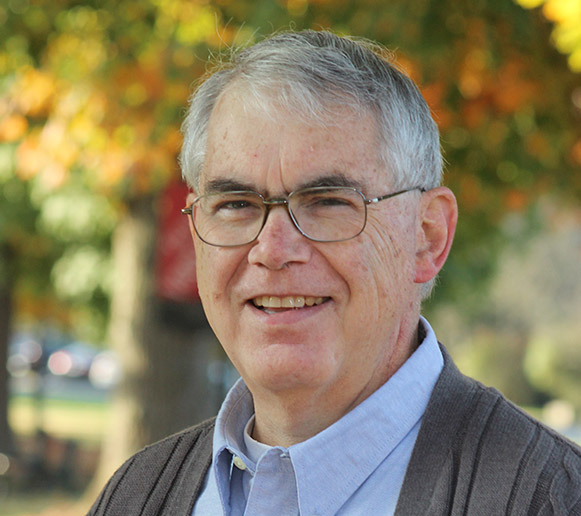The Catholic College of the South
Dr. Michael McLeod
Meet Dr. Michael McLeod
OF NOTE:
I was a fellow of the American Council on Education. Besides teaching Biology courses I also help teach the History of WWII course.
KNOWN FOR:
Offering interesting and rigorous classes and caring about students.
WHEN NOT IN THE CLASSROOM, CAN OFTEN BE FOUND:
doing photography and traveling to interesting places.
POPULAR QUOTE:
“Any fool can know..The trick is to understand.” -Albert Einstein
Examples of the classes taught by Dr. Michael McLeod:
- Cell Biology
- Human Physiology
- Human Anatomy
- Histology
- Embryology
- Environmental Science
- Environmental Issues
- Senior Seminar
- Ph.D., Zoology, Miami University, Oxford, OH, August 1977
- M.S., Biology, East Tennessee State University, Johnson City, TN, June, 1973
- B.S., Biology, Lincoln Memorial University, Harrogate, TN, December, 1969
- Registry in Cytotechnology (ASCP), Brooke General Hospital, Fort Sam Houston, TX, February, 1973
Paper Presentations
- 1976 A preliminary biochemical systematic study of Capsicum (Solanaceae); with W. H. Eshbaugh and S. I. Guttman. International symposium on biology and taxonomy of The Solanaceae. Birmingham, England.
- 1977 Evolutionary investigations in the chili peppers Capsicum (Solanaceae). Annual meeting of the Society for the Study of Evolution. Ithaca, New York.
- 1978 Numerical taxonomic analyses of allozyme variation in Capsicum (Solanaceae); with R. J. Jensen, W. H. Eshbaugh, and S. I. Guttman. Society of Economic Botany meeting, St. Louis, MO.
- Systematic Studies of the Capsicum baccatum complex; with S. I. Guttman and W. H. Eshbaugh. Society of Economic Botany meeting. St. Louis, MO.
- Genetic and Morphological variation in the fingernail clam, Sphaerium striatinum Lamarck; with D. J. Hornbach, S. I. Guttman, and S. K. Seilkop. American Malacological Union Meeting, Wilmington, NC.
- 1980 An electrophoretic study of Corbicula fluminea in the Catawba River, N. C., with D. S. Sailstad. American Malacological Union Meeting, Louisville, KY.
- 1981 Patterns of speciation in Capsicum (Solanaceae); with W. H. Eshbaugh and S. I. Guttman. International Botanical Congress, Australia.
- 1982 Electrophoretic variation in Corbicula. Joint meeting: American Malacological Union, Second International Symposium on Molluscan Genetics, New Orleans, LA.
- 1983 Electrophoretic variation in U. S. Corbicula. Second International Corbicula Symposium, Little Rock, AR.
- 1984 Possible rapid accumulation of genetic variation in populations of Corbicula. North Carolina Academy of Sciences Meeting, Wake Forest, NC.
- 1986 Population genetics of a very successful colonizer: the introduced Asiatic clam Corbicula in North America. Ninth International Malacological Congress, symposium on the Biology of Introduced Species. Edinburgh, Scotland.
- 1987 Preliminary report on an institute for Junior High School science teachers with E. M. Baker. North Carolina Academy of Sciences, Raleigh, NC.
- 1989 Successful Science Teaching and Demonstrations, with E. M. Baker, North Carolina Academy of Sciences Meeting, Raleigh, NC.
- 1990 RFLP analysis of mtDNA from a single population of Corbicula, with S. Reilly and H. Rhyne, North Carolina Academy of Sciences Meeting, High Point, NC.
- 2002 Preliminary allozyme analysis of Magnolia macrophylla Michaux in Gaston County, NC., with W. Stigerwald and S. Reilly, Association of Southeastern Biologists annual meeting.
- 2002 Electrophoretic analysis of Magnolia macrophylla Michaux in Gaston County, North Carolina., with S. Reilly, The Andre Michaux International Symposium
- Evolutionary and biochemical genetics
- Physiology
- Environmental adaptation
- Fellow of the American Council on Education
- Lincoln Memorial University Educator’s Hall of Fame
- Adrian Faculty Excellence Award recipient, Belmont Abbey College
- Spirit of St. Benedict Award, Belmont Abbey College
- Past President, North Carolina Academy of Sciences


